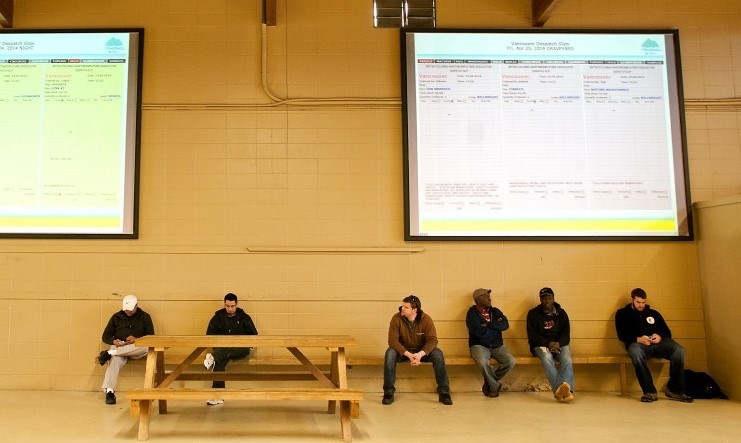It will be crisis management time for the local, regional and national economies if that crunch escalates to a head-on collision and strike notice turns into full-scale job action that disrupts cargo flow through Canada’s Asia-Pacific Gateway.
As Shipping Federation of Canada president Chris Hall told BIV, any disruption or work stoppage along B.C.’s waterfront “will be catastrophic on a number of levels.”
One of those levels is critical to the present and future buoyancy of trade through the Asia-Pacific Gateway in what is a relentlessly competitive transpacific cargo movement marketplace: reliability and consistency.
Major ocean carriers bank heavily on both. So do their customers. The pandemic economy’s wild swings in shipping demand on the transpacific and other major trade routes seriously eroded reliability up and down the supply chain.
Building it back up is a hard-won priority.
So, any threats of derailing that rebuilding effort anywhere along the supply chain will quickly trigger Plan B in shipping circles.
A potential labour disruption is one of those major threats.
“The repetitional damage that occurs is immeasurable, and it’s long-lasting,” Hall said. “And not just to the port or that region or the gateway. It reflects on the country at large in terms of what it’s like to do business with Canada … and that really plays a role in how our exports are viewed in the world market.”
Up until last week, the potential for labour disruption along the West Coast extended up and down North America. But a tentative deal announced June 14 between approximately 22,000 unionized workers at U.S. West Coast ports and the Pacific Maritime Association has lowered the labour confrontation temperature along the waterfront south of the border. The six-year deal, which must still be ratified by both sides, covers all 29 West Coast U.S. ports. Unionized workers at those ports have been without a new contract since July 2022.
In B.C., the cooling-off period triggered by the federal conciliation process ends on June 21, after which a 72-hour strike or lockout notice can be issued by either side in the contract negotiations.
The International Longshore & Warehouse Union Canada (ILWU) membership has already voted 99.24 per cent in favour of strike action to back contract demands. So, if June 21 comes and goes with no sign of an agreement for a new contract, the ILWU could be on strike as early as June 24.
Its five-year contract with the BC Maritime Employers Association (BCMEA) expired at the end of March.
A strike at any time at B.C. ports is not good news. But a strike at this time would be far worse news for several reasons.
Consider, for example, that the Port of Vancouver is still struggling to recover.
The recent release of the 2022 Container Port Performance Index (CPPI) underscores that struggle. The index, released by the World Bank Group in co-operation with S&P Global Market Intelligence, measures and compares major global ports’ container cargo handling efficiency based on the overall in-port time of container ships.
The third annual compilation of the CPPI ranks Vancouver 347th out of the 348 major global ports included in the index compiled based on 2022 data. That is one rung lower than .
Consider also that there has been an ongoing migration of transpacific container cargo away from West Coast North American ports to competitors in Mexico and along the Gulf of Mexico and East Coast North America. That migration began following the opening of the widened Panama Canal in 2016 and accelerated during the port congestion crisis at Los Angeles-Long Beach and other major marine container hubs sparked by the pandemic.
Add in the overall slowdown in port traffic resulting from the global economic downturn in 2023 and you have a recipe for a serious business downturn at ports up and down North America’s West Coast.
As Christian Roeloffs noted in his most recent container cargo analysis, “Coupled with low demand, the industry continues to grapple with overcapacity of containers and vessel capacity.”
The CEO of Container xChange, a global logistics technology company, added that the supply-demand imbalance in the sector is set to worsen with a major influx of new ships and low scrapping rates of older vessels.
World Bank numbers also show growth in the global economy slowing to 2.1 per cent this year compared with 3.1 per cent in 2022.
So, it is not a good time to compromise B.C.’s port reliability reputation, which suffered badly in the 1970s, when there were lengthy longshore labour disruptions, and again in the late 1990s when employers locked out the ILWU.
Negotiations to secure ranged between 18 months and two years.
This time around, the ILWU filed a notice of dispute with the federal government after only a handful of meetings with the BCMEA.
Why?
“Why leave the entire country waiting for a year and a half?” ILWU president Rob Ashton told BIV prior to addressing a June 14 press conference called to oppose the $3.5 billion Terminal 2 expansion project at Roberts Bank. “Get it done soon, get it done quick and get the worry and wait over so that everybody knows Canada is in business.”
Getting it done soon would be everyone’s preference, especially considering the tentative dockworker deal that has been done in the U.S. But crunch time this week will determine whether getting a new dockworker contract done soon is in the cards for B.C.




